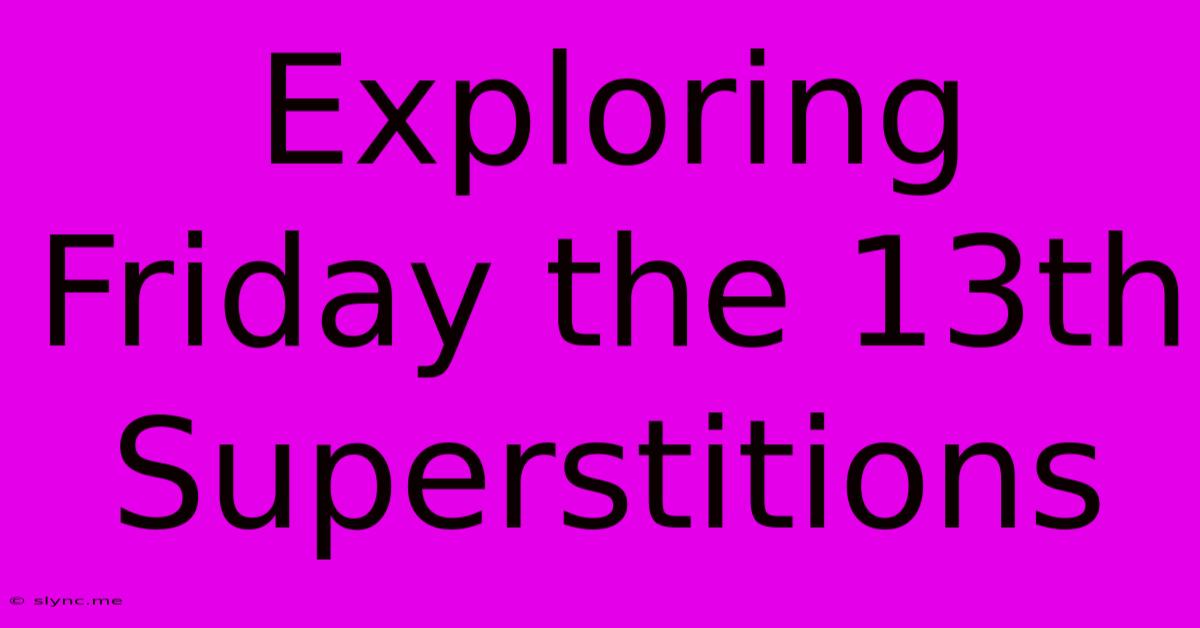Exploring Friday The 13th Superstitions

Discover more detailed and exciting information on our website. Click the link below to start your adventure: Visit Best Website Mrs.Amykhan. Don't miss out!
Table of Contents
Exploring Friday the 13th Superstitions: Unraveling the Myths and Fears
Friday the 13th. The phrase itself conjures images of black cats, broken mirrors, and looming misfortune. But where did this potent superstition originate, and why does it continue to hold such sway over our imaginations? Let's delve into the history and psychology behind this enduring fear.
A Journey Through History: Tracing the Roots of Friday the 13th
While the exact origins remain shrouded in mystery, several historical and cultural factors contribute to the superstition's enduring power.
Biblical Influences:
Some trace the fear back to the Last Supper, where 13 guests were present before the betrayal and crucifixion of Jesus. The number 13, therefore, became associated with betrayal and bad luck. Friday, of course, is the day of Christ's crucifixion, solidifying its association with tragedy.
The Knights Templar:
Another theory involves the Knights Templar, a powerful medieval military order. Friday, October 13th, 1307, marked the arrest and persecution of the Templars by King Philip IV of France. This event further cemented Friday the 13th's association with misfortune and betrayal in popular consciousness.
The Psychology of Superstition: Why We Believe
Even those who don't explicitly believe in the superstition often find themselves feeling a bit uneasy on Friday the 13th. This unease stems from a few psychological factors:
Confirmation Bias:
We tend to remember instances that confirm our existing beliefs. If something bad happens on Friday the 13th, we're more likely to recall it and reinforce the superstition. Positive events on that day are easily forgotten.
Apophenia:
This is the tendency to perceive meaningful connections between unrelated events. If a car accident occurs on Friday the 13th, we might attribute it to the day's supposed ill omen, ignoring other contributing factors.
The Power of Suggestion:
The widespread awareness of the Friday the 13th superstition itself creates a self-fulfilling prophecy. Knowing about it can subconsciously increase anxiety and influence our behavior, potentially leading to more cautious actions that ironically reduce the likelihood of accidents or mishaps.
Debunking the Myth: Is There Any Real Danger?
Statistically, there's no evidence that Friday the 13th is any more dangerous or unlucky than any other day. Accident rates, hospital admissions, and other indicators show no significant increase on these dates. The fear is largely a psychological phenomenon.
Embracing the Day: Turning Fear into Fun
Instead of succumbing to fear, why not embrace the playful aspect of Friday the 13th? Many people use the day as an opportunity for:
- Lighthearted jokes and memes: Sharing humorous content can turn the potentially negative energy into a positive and shared experience.
- Creative expression: Artists and writers might find inspiration in the day's ominous reputation.
- Challenging your own superstitions: Consciously choosing to ignore the superstition can be a fun exercise in personal empowerment.
Conclusion: A Legacy of Fear and Fascination
The Friday the 13th superstition continues to fascinate and, for some, frighten. Its enduring power lies not in any inherent truth, but in its ability to tap into our deep-seated anxieties and the human tendency to seek patterns and meaning in the world around us. Whether you embrace it with humor or navigate it with caution, understanding its origins and the psychology behind it allows us to appreciate the enduring legacy of this compelling cultural phenomenon.

Thank you for visiting our website wich cover about Exploring Friday The 13th Superstitions. We hope the information provided has been useful to you. Feel free to contact us if you have any questions or need further assistance. See you next time and dont miss to bookmark.
Also read the following articles
| Article Title | Date |
|---|---|
| Ciri As Witcher 4 Protagonist Official | Dec 13, 2024 |
| Pidsumki The Game Awards 2024 Peremozhtsi | Dec 13, 2024 |
| Rosiya Vtratila Konstruktora Kh 59 Ta Kh 69 | Dec 13, 2024 |
| Qantas Strike Disrupts Busiest Travel Day | Dec 13, 2024 |
| Geminid Meteor Shower Australia This Weekend | Dec 13, 2024 |
